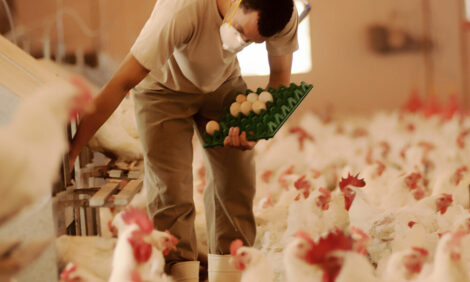



Development of Vaccine-induced Immunity against TRT in Turkeys
The frequency of turkey rhinotracheitis (TRT) outbreaks and/or failure of TRT vaccination could be correlated with differences in the immunological status and/or the age at vaccination, according to this new work from Poland.Avian metapneumovirus (aMPV) infections have a huge economical impact on the poultry industry worldwide, according to a new paper published in BMC Veterinary Research by scientists at the University of Warmia and Mazury in Poland.
Marcin Smialek and colleagues explain that although maternal antibodies do not protect turkey poults against TRT, almost no studies have been conducted so far regarding the impact of these antibodies on vaccine induced immunity development against aMPV infection.
They conducted four experiments on commercial turkeys aimed at comparing local humoral and cell-mediated immune response of maternally delivered anti-aMPV antibody positive (MDA+; Experiment I and II) and negative (MDA-; Experiment III and IV) turkeys following vaccination with an attenuated live aMPV subtype A vaccine at the day of hatch (Experiment I and III) or at two weeks of age (Experiment II and IV).
Regardless of the birds’ age, vaccination of MDA- turkeys resulted in strong stimulation of CD8+ T lymphocytes in the Harderian gland and tracheal mucosa, whereas vaccination of MDA+ birds stimulated mainly CD4+ T cells in those structures.
An increase in the level of anti-aMPV IgY antibodies was noted in the serum (but not in tracheal washings) as early as seven days after vaccination but only in birds possessing low levels (MDA+ birds vaccinated at two weeks of age) or no maternal anti-aMPV antibodies at the time of vaccination.
In MDA+ turkeys vaccinated at hatch, the decrease in serum levels of maternal anti-aMPV antibodies proceeded faster than the control group, which, together with faster viral clearance, indicates that maternal antibodies can inhibit vaccine virus replication and influence the development of vaccine-induced immunity.
Smialek and colleagues conclude that their study provides the first documented evidence that the frequency of TRT outbreaks in the field and/or failure of TRT vaccination could be correlated with differences in the immunological status and/or the age of vaccinated turkeys.
Reference
Smialek M., D. Pestka, B. Tykalowski, T. Stenzel and A. Koncicki. 2015. Development of vaccine-induced immunity against TRT in turkeys depends remarkably on the level of maternal antibodies and the age of birds on the day of vaccination. BMC Veterinary Research. 11:28. doi:10.1186/s12917-015-0345-5
Further Reading
You can view the full report by clicking here.
Find out more information on TRT by clicking here.
March 2015











